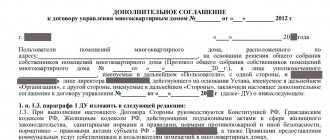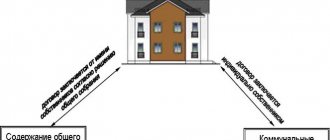Owners of apartments in modern multi-storey buildings have a unique opportunity to independently choose an effective form of house management.
In addition to signing an agreement with the Management Company, residents can choose for themselves such a form as direct management. But it must be borne in mind that the number of houses in which this form is legally permitted is limited.
The direct method of managing an apartment building is permitted only for those apartment buildings that contain no more than 16 apartments . This restriction came into force in 2015 after the release of Federal Law No. 255.
This law led to some changes in housing legislation. According to it, property owners in multi-apartment buildings can choose between two forms for managing their houses - the Homeowners' Association and the Management Company, with which they must sign an agreement.
ATTENTION! If a building with a large number of apartments used the direct control method before 2015, you need to switch to another method.
Principle of operation
Residents of an apartment building distribute responsibilities for managing the house among themselves. There are several options for such a decision, which is made at a general meeting of residents.
- Apartment owners can distribute all responsibilities for managing the house evenly (or unevenly) among themselves. They also have direct contact with third parties, such as employees of home maintenance companies or construction crews.
- One person can assume all the powers to manage the lives of the house; the housemates trust him to protect their interests. This is a responsible job for someone who has taken on the responsibility of ensuring the normal life of an apartment building; it will require not only a desire to act, but also competence in housing issues.
- Another advantageous option is that a third party who is not the owner of the apartment in this building receives management rights. The third party will not be considered a manager; he receives only representative duties.
Approval procedure
The process of switching to this method of managing a house takes more than one day.
First, the initiative group gathers like-minded people and finds out the residents’ opinions on the form of management.
You need to start preparing for the general meeting, choose the date, time and place of its holding, and post announcements about this important event in advance. The announcement must indicate what issues are being submitted for consideration. All legislative standards regarding the rules of general meetings of residents must be observed.
The meeting regarding the choice of form of governance can be in person or in absentia; in the second case, ballots for voting for one or another option are distributed. In addition to the management method, it is also necessary to elect persons who will represent the interests and powers of residents, and to select utility service providers. The decision is recorded in the protocol.
How are contracts concluded with service organizations?
An agreement with suppliers of gas-electricity-heat-water supply resources is drawn up between a legal entity (resource holder) and an individual - the owner of the apartment.
Thus, apartment owners either individually enter into contracts with each supplier, or delegate their powers to one official representative, who acts on behalf and in the interests of the remaining owners of MKD apartments.
If within a year after choosing the direct form of management the owners have not concluded an agreement, it is considered that their management has not taken place. The owners of the premises will be deprived of their own management; the administration will announce a competition to select a management company.
Download the contract for direct management of an apartment building with a service organization (sample)
Distinctive features
Before approving direct control of their home, residents should receive information about its features.
- Apartment owners pay utility bills directly to their suppliers. At the same time, they do not need to spend money on fees to the HOA or on the maintenance of the Management Company.
- It is valuable that accounting is kept openly, all residents of the apartment building know about income and expenses, which eliminates the risk of theft of funds.
- Problems may arise due to unscrupulous neighbors who are unwilling to pay utility bills on time. Debts can be collected in court, but during this time it will be necessary to resolve complex problems with suppliers.
- The state does not provide any programs to subsidize houses that are directly managed. State programs apply only to those apartment buildings that have chosen a Management Company or Homeowners Association. Therefore, residents of even low-rise apartment buildings should choose one of the two control methods indicated.
- Additional services may be provided in the house, but apartment owners pay for them at their own discretion.
Payment is required to be made only for basic services. If one of the residents initiated repairs to the entrance without first collecting money, it may happen that he will have to pay for the repairs personally.
IMPORTANT! The house is managed free of charge; an initiative group or one person to whom residents have entrusted management works for free.
Is it worth managing an apartment building yourself?
We have highlighted some of the features of management in the form of a visual table so that you can weigh the pros and cons and decide whether this form of management is right for you or not.
Table of advantages and disadvantages for direct control of MKD:
| pros | Minuses |
| The undoubted advantages include some cost savings, which are generated due to the absence of a management apparatus. However, we must not forget that it will not be possible to get rid of all expenses: payment for the services of janitors, repairmen, plumbers. However, spending money on utilities in accordance with the wages of invited craftsmen contributes to the rational use of funds. | With direct management of apartment buildings, the opportunity to receive social programs is lost: for example, the arrangement of a children's playground. Apartment owners will also lose the right to financial support during major repairs. Also, this form of management does not involve control by housing inspectors. More independence, but also much more responsibility. |
| Apartment owners are not responsible for a person who does not pay utility bills. The service provider has the right to collect the debt directly from the debtor, which does not affect the interests of other residents. | If there is a need for any improvements, and some of the apartment owners refused to take part in them, then the costs fall on the shoulders of only the interested parties. Unless otherwise provided by the decision of the general meeting, of course. |
| Personal interest in profitable contracts, prices, conscientious contractors, comfortable conditions, the most transparent management and monetary schemes - what’s not an advantage? | Management will take a lot of personal time from the initiative group or chairman. And he, by the way, will probably have to perform his duties without remuneration. Difficulties in maintaining documentation and reporting. |
| All funds collected are spent on maintaining the common property of one apartment building. While the management company distributes money among all the houses it manages. | Problems with suppliers and contractors will have to be resolved without any outside help. It is also possible that no agreement can be reached on certain issues between the owners themselves. The presence of significant disagreements will complicate the process of direct management. |
Advantages and disadvantages
Despite the fact that residents of houses with a small number of apartments are offered several modern ways of managing their home, many of them still prefer the direct form. With it, they do not feel so many bureaucratic tricks; there are no administrative superstructures over this method .
Residents make all decisions regarding house maintenance promptly; the wishes, comments and suggestions of all residents of the apartment building are taken into account.
This form has many advantages.
- Residents of the house will be able to achieve savings on utility costs, as they work without intermediaries, directly with suppliers, and can control the volume of services provided.
- Issues regarding maintenance, maintenance, and repairs are decided by homeowners at their own discretion.
- There is no such thing as collective responsibility.
There are also disadvantages to this form of management.
- Additional services are paid by those who agree to such expenses.
- There is no opportunity to participate in government programs.
- Repair of common areas, improvement of the house and local area - all this falls on the shoulders of apartment owners.
- Sometimes in such houses conflicts may even arise related to the distribution of money; this worsens the atmosphere in the house and the relationship between neighbors.
Over time, apartment owners may change their view of the form of building management used and choose another one, which is permitted by Federal Law No. 255, adopted in 2015. They can create a Homeowners Association or sign an agreement with a Management Company.
Legislation
Residents independently enter into contracts with utility providers and construction organizations . They need to be very careful and legally literate so as not to run into problems.
The main law that regulates direct management is Article 164 of the Housing Code. This form of management takes into account several regulations.
- Rules for carrying out activities related to the management of apartment buildings. They were approved by Resolution No. 416 of the Government of the Russian Federation dated May 15, 2013.
- Rules for the provision of services and performance of work on the content of MKD. They were approved by Government Decree of 04/03/2013.
- Also by the Decree of the Government of the Russian Federation dated 03.04. 2013, under No. 290, the Minimum List of Services and Works was approved.
What other changes have occurred in the legislation that may affect issues related to the direct management of the house? Residents of the house can place funds collected for major repairs in a deposit account of one of the banks .
In this case, they will be able to protect finances from inflationary processes if repair work is delayed. A person who does not live in the house, but has a power of attorney from the owner of the apartment, can come to vote at the general meeting. The power of attorney must be certified by a notary or at the place of work.
And you need to remember that direct management can be chosen for a house, according to Federal Law No. 255, in which there are no more than 16 apartments.
Management agreement for an apartment building with a management organization
An apartment building can be managed by only one management organization (Part 9 of Article 161 of the Housing Code of the Russian Federation). The management agreement for an apartment building is concluded in writing by drawing up one document signed by the parties. When choosing a management organization by a general meeting of owners of premises in an apartment building, a management agreement is concluded with each owner of premises in such a building on the terms specified in the decision of this general meeting. In this case, the owners of premises in this building, having more than fifty percent of the votes of the total number of votes of the owners of premises in this building, act as one party to the concluded agreement.
Under an agreement for the management of an apartment building, one party (the management organization) on the instructions of the other party (the owners of the premises in the apartment building, the management bodies of the homeowners' association, housing cooperative, other specialized consumer cooperative or, in the case provided for by law, the developer) for an agreed period of time for a fee undertakes to provide services and carry out work for the proper maintenance and repair of common property in such a building, to provide utilities to the owners of premises in such a building and to persons using the premises in this building, and to carry out other activities aimed at achieving the goals of managing an apartment building.
The management agreement for an apartment building, concluded in the manner established by the Housing Code of the Russian Federation, must be placed by the management organization in the system in the manner established by the federal executive body exercising the functions of developing and implementing state policy and legal regulation in the field of information technology, together with the federal an executive body that carries out the functions of developing and implementing state policy and legal regulation in the field of housing and communal services.
The law defines the content of the contract; it must indicate:
1) the composition of the common property of the apartment building in respect of which management will be carried out, and the address of such a building; It is not possible to make a description of the common property; the owners do not have such documentation, and the contracts would be very cumbersome. A floor plan of the house is enough.
2) a list of services and works for the maintenance and repair of common property in an apartment building, the procedure for changing such a list, as well as a list of utilities provided by the management organization;
3) the procedure for determining the contract price, the amount of payment for the maintenance and repair of residential premises and the amount of payment for utilities, as well as the procedure for making such payment;
4) the procedure for monitoring the management organization’s fulfillment of its obligations under the management agreement.
The terms of the management agreement for an apartment building are established the same for all owners of premises in the apartment building. The use of this rule is problematic due to the presence of non-residential premises owners in the house and different levels of services.
The management agreement for an apartment building, with the exception of the agreement concluded by the developer, is concluded for a period of no less than one year and no more than five years, and a mandatory agreement for a period of no less than one year and no more than three years.
In the absence of an application from one of the parties to terminate the management agreement for an apartment building at the end of its validity period, such an agreement is considered extended for the same period and on the same conditions as provided for in such an agreement.
Unless otherwise established by the management agreement for an apartment building, the management organization is obliged to begin implementing such an agreement no later than thirty days from the date of its signing.
Changes and (or) termination of the management agreement for an apartment building are carried out in the manner prescribed by civil law. For a mandatory agreement concluded as a result of a competition, the Housing Code of the Russian Federation establishes special rules for the unilateral refusal of its execution by the owners on the basis of a decision of the general meeting:
1) after each subsequent year, if they have chosen the method of managing an apartment building
2) if the management organization does not comply with the terms of the contract
The management organization, thirty days before the termination of the management agreement for an apartment building, is obliged to transfer the technical documentation for the apartment building and other documents related to the management of such a house to the newly selected management organization, a homeowners' association or a housing cooperative or other specialized consumer cooperative, or in the case of direct management of such a house by the owners premises in such a house to one of these owners, indicated in the decision of the general meeting of these owners on the choice of the method of managing such a house, or, if such an owner is not indicated, to any owner of premises in such a house.
Unless otherwise established by the management agreement for an apartment building, the management organization annually, during the first quarter of the current year, submits to the owners of premises in the apartment building a report on the implementation of the management agreement for the previous year.
As a third method, the possibility of creating an HOA is indicated - this is a non-profit organization, the creation and activities of which are regulated by Section 6 of the Housing Code of the Russian Federation. History of the Federal Law dated May 24, 1996 “On Homeowners’ Associations.” There is a fairly developed institute abroad: USA, Germany. Advantages: accumulation of funds in the account, control by the owners, fast service due to the dispatch service. In Russia, the number of HOAs has increased significantly over the past three years. Difficulties: defaulters, choice of repair organizations, they are mostly municipal, i.e. no competition.
A homeowners' association is a non-profit organization, an association of owners of premises in an apartment building for joint management of common property in an apartment building or the property of owners of premises in several apartment buildings or the property of owners of several residential buildings, ensuring ownership, use and, within the limits established by law, disposal of common property in an apartment building house or joint use of property owned by the owners of premises in several apartment buildings, or property owned by the owners of several residential buildings, carrying out activities to create, maintain, preserve and increase such property, providing utilities to persons using the premises in accordance with this Code in these apartment buildings or these residential buildings, as well as for carrying out other activities aimed at achieving the goals of managing apartment buildings or for the joint use of property belonging to the owners of premises in several apartment buildings, or the property of the owners of several residential buildings.
The concept of a homeowners' partnership has been significantly expanded. Firstly, the legislator tried to include in it all possible options (models) for creating the specified legal entity. This is not only an association of owners of one apartment building, as mentioned earlier, but also of several apartment buildings or several residential buildings. Taking into account, however, the fact that, according to Part 2 of Art. 136 of the Housing Code of the Russian Federation, a partnership can also be created by the owners of country houses; the definition from these positions still cannot be regarded as universal. Secondly, the functions of this non-profit organization have been somewhat modified and expanded. Nowadays we are not talking about managing a complex of real estate, but managing the common property of an apartment building, which is more consistent with the entire terminology of the Housing Code of the Russian Federation. In addition, on the one hand, the need to ensure the operation of common property has been removed from the purposes of creating an organization, probably for the reasons that it is an integral part of the concept of “common property management”; on the other hand, another function has been added to create, maintain, preservation and growth of such property, provision of public services. In the list of actions denoting the last function, in our opinion, there is clearly that part that is already covered by the concept of “management”, and, therefore, there is no need to specifically consolidate it in the definition. This conclusion is confirmed by the indication that completes the definition about any other possible activity aimed at achieving management goals. Then the question arises: why repeat ourselves, superimposing similar concepts on top of each other? If there is a need, within the framework of the definition of a partnership, to disclose or detail management activities in detail, then the structure of the definition itself should, from our point of view, be different. The function associated with ensuring ownership, use and, within the limits established by law, disposal of common property has been retained in its previous form only in relation to a partnership organized in one apartment building. For other models, it only sounds like “sharing of property.” This differentiated approach is not entirely logical. That is, with regard to other forms of partnership, we can no longer talk about the disposal of common property, which is not entirely explainable. It is logical to either completely exclude this possibility, so as not to compete with the activities (competence) of the general meeting of owners of the premises of an apartment building, or to preserve it for all types of partnerships, regardless of the specifics of their creation. Otherwise, an HOA created by merging several apartment buildings, which also have property that is in common shared ownership, is a truncated version of the organization in terms of the tasks assigned to it; it will not be able to fully carry out the activities intended by the legislator for such legal entities, therefore the association owners of several small houses to create one organization will no longer be so effective.
As noted by the Resolution of the Constitutional Court of the Russian Federation of April 3, 1998, HOAs as one of the possible methods of management and membership in it is derivative in relation to the right of ownership, the emergence of ownership rights cannot be made dependent on membership in the HOA.
Membership in the HOA arises from the owner of the premises in an apartment building on the basis of an application for membership in the HOA (Article 143 of the Housing Code of the Russian Federation). (unlike residential complexes, housing cooperatives, the procedure for its consideration and payment of entrance fees has not been established, since we are talking about the owner) Membership in the homeowners’ association is terminated from the moment of filing an application to leave the partnership members or from the moment of termination of the partnership member’s ownership of the premises in an apartment building.
The register of members of a homeowners' association must contain information allowing identification of members of the association and communication with them, as well as information on the size of their shares in the right of common ownership of common property in an apartment building.
The number of members of the homeowners' association who created the partnership must exceed fifty percent of the votes of the total number of votes of the owners of premises in an apartment building.
As any legal entity is subject to state registration, the constituent document is the Charter. When state registration of a homeowners' association, the minutes of the general meeting of owners of premises in an apartment building are submitted, at which decisions were made on the creation of the partnership and on the approval of its charter, and the charter of the partnership, as well as information about the persons who voted at the general meeting of owners of premises in an apartment building for the creation homeowners' associations, about the shares belonging to these persons in the right of common ownership of common property in an apartment building.
It is no coincidence that innovations have appeared in the Housing Code of the Russian Federation regarding the procedure for registering a homeowners' association. A number of researchers correctly note that a homeowners’ association differs significantly from other categories of legal entities in terms of goals, objectives and procedure for creation. A simplified registration procedure for such a legal entity may create preconditions for violating the rights of the owners of residential premises in an apartment building.
The charter of the homeowners' association is adopted at a general meeting, which is held in the manner established by Articles 45 - 48 of the Housing Code of the Russian Federation, by a majority vote of the total number of votes of the owners of premises in an apartment building. The charter of the homeowners' association may provide for the use of a system or other information system when resolving issues related to the management of the homeowners' association, taking into account the functions of these systems.
The minutes of the general meeting of owners of premises in an apartment building, at which decisions were made on the creation of a homeowners' association and the approval of its charter, are signed by all owners of premises in an apartment building who voted for the adoption of such decisions.
A homeowners' association is created without a limitation on the period of activity, unless otherwise provided by the charter of the association.
Due to the fact that we are talking about a voluntary association, not all owners can be members of the HOA; in this case, the HOA enters into an agreement with the rest of the HOA on the maintenance and repair of the house, since they bear the burden of maintaining the property.
Owners of premises in an apartment building can create only one HOA. (the reason for this is the unity of objects of common property, although previously a different situation was allowed) The decision on creation is made at a general meeting.
A homeowners' association can be created:
The effect of paragraph 1 of part 2 of Article 136 (as amended on June 4, 2011) does not apply to homeowners’ associations created before the entry into force of Federal Law dated June 4, 2011 N 123-FZ (
1) owners of premises in several apartment buildings, if these houses are located on land plots that, in accordance with the documents contained in the state real estate cadastre, have a common border and within which there are engineering support networks and other infrastructure elements that are intended for joint use owners of premises in these houses. Decisions on the creation of a partnership, on approval of its charter, election of the board of the partnership, on vesting a citizen (including the owner of premises in one of these houses) with the authority of the applicant to apply to the authorities carrying out state registration of legal entities, and in cases provided for by the charter of the partnership, Also, the election of the chairman of the board of the partnership is adopted at general meetings of the owners of premises in each apartment building by a majority of at least two-thirds of the votes of the total number of votes of the owners of premises in the given building. The specifics of the adoption and execution of these decisions are established by the federal executive body that carries out the functions of developing state policy and legal regulation in the field of construction, architecture, urban planning (with the exception of state technical accounting and technical inventory of capital construction projects) and housing and communal services;
2) owners of several nearby residential buildings, country houses with or without personal plots, garages and other objects, if these houses are located on land plots that have a common border and within which there are utility networks and other infrastructure elements, which are designed to serve more than one residential building. Decisions on the creation of a partnership and the approval of its charter are made by agreement of all owners of these houses. Decisions on the election of the board of the partnership, on granting a citizen (including one of the owners of residential buildings) the authority of the applicant to apply to the bodies carrying out state registration of legal entities, and in cases provided for by the charter of the partnership, also on the election of the chairman of the board of the partnership are made at a general meeting owners of residential buildings by a majority of at least two-thirds of the total number of votes of owners of residential buildings.
The possibility of creating a partnership between the owners of premises in several apartment buildings is significantly limited. The efficiency of partnerships designed for a large number of houses and apartments is low, given that we are talking about non-professional participants in emerging relationships, so the removal of this opportunity from our position will not negatively affect the rights of owners. Other previously used and in need of clarification conditions for organizing this type of partnership have been clarified: the concept of “common (adjacent)” land plots has been deciphered - these are plots that, in accordance with the documents contained in the state real estate cadastre, have a common border; an additional feature is indicated for infrastructure elements located within the boundaries of these areas - “intended for joint use by the owners of the premises in these houses.”
As before, it is allowed to create a homeowners’ association not only to manage the common property of an apartment building, but also when merging several closely located residential and country houses in order to resolve common issues. Since they have certain specifics, such organizations have their own procedure for creating (by agreement of all owners) and electing bodies. Indeed, in the absence of common shared ownership, the principle of “majority votes” cannot be applied when creating a partnership and approving its charter.
To represent and protect common interests in the management of apartment buildings, two or more homeowners' associations, by agreement among themselves, can create an association (union) of homeowners' associations.
The governing bodies of the HOA are:
General meeting of members and board (Article 144 of the Housing Code of the Russian Federation). Why is the chairman not named???, although it is indicated that he, without a power of attorney, exercises the legal personality of a legal entity. All bodies are formed from among the members of the HOA (Article 149 of the Housing Code of the Russian Federation)
The control body is the audit commission (auditor). Is it possible to involve non-members of the HOA? – there is no direct instruction from the Housing Code of the Russian Federation.
The general meeting of members of the homeowners association is the highest governing body of the association and is convened in the manner established by the charter of the association.
The competence of the general meeting of members of the homeowners association includes:
1) introducing amendments to the charter of the partnership or approving the charter of the partnership in a new edition;
2) making decisions on the reorganization and liquidation of the partnership, appointing a liquidation commission, approving interim and final liquidation balance sheets;
3) election of members of the board of the partnership, members of the audit commission (auditor) of the partnership and, in cases provided for by the charter of the partnership, also the chairman of the board of the partnership from among the members of the board of the partnership, early termination of their powers;
4) establishing the amount of obligatory payments and contributions of members of the partnership;
5) approval of the procedure for the formation of the partnership’s reserve fund, other special funds of the partnership (including funds for current and major repairs of common property in an apartment building) and their use, as well as approval of reports on the use of such funds;
6) making a decision on obtaining borrowed funds, including bank loans;
7) determining the directions for using income from the economic activities of the partnership;
approval of an annual plan for the maintenance and repair of common property in an apartment building, a report on the implementation of such a plan;
8.1) approval of estimates of income and expenses of the partnership for the year, reports on the implementation of such estimates, audit reports (in the case of audits);
8.2) approval of the annual report on the activities of the management board of the partnership;
8.3) approval of the conclusion of the audit commission (auditor) of the partnership based on the results of the audit of the annual accounting (financial) statements of the partnership;
9) consideration of complaints against the actions of the board of the partnership, the chairman of the board of the partnership and the audit commission (auditor) of the partnership;
10) adoption and amendment, upon the proposal of the chairman of the board of the partnership, of the internal regulations of the partnership in relation to employees whose responsibilities include the maintenance and repair of common property in an apartment building, provisions on the payment of their labor, approval of other internal documents of the partnership provided for by this Code, the charter of the partnership and decisions of the general meeting of members of the partnership;
11) determining the amount of remuneration for members of the board of the partnership, including the chairman of the board of the partnership;
— other issues provided for by this Code or other federal laws. The charter of the homeowners association may also include the resolution of other issues in addition to those specified in Part 2 of this article within the competence of the general meeting of members of the association.
Article 146. Procedure for organizing and holding a general meeting of members of the homeowners association
Notification of a general meeting of members of a homeowners' association is sent in writing by the person on whose initiative the general meeting is convened, and is given to each member of the partnership against signature or by mail (registered mail) or in another way provided for by the decision of the general meeting of members of the partnership or the charter of the partnership . The notice is sent no later than ten days before the date of the general meeting.
The powers of the general meeting of members of the homeowners association are established in accordance with Article 45 of this Code and the charter of the partnership. The general meeting of members of a homeowners' association is valid if it is attended by members of the association or their representatives who have more than fifty percent of the votes of the total number of votes of the members of the association.
Decisions of the general meeting of members of the homeowners' association on issues referred by this Code to the competence of the general meeting in accordance with paragraphs 2, 6 and 7 of part 2 of Article 145 of this Code are adopted by at least two-thirds of the votes of the total number of votes of the members of the association. Decisions on other issues are made by a majority vote of the total number of votes of the members of the partnership or their representatives present at the general meeting.
The general meeting of members of the homeowners association is chaired by the chairman of the board of the association or his deputy. In case of their absence, the general meeting is chaired by one of the members of the board of the partnership.
Board of the homeowners association (Article 147 of the Housing Code of the Russian Federation)
The board of a homeowners association is the executive body of the partnership, accountable to the general meeting of members of the partnership; it manages the activities of the homeowners association and is carried out by the board of the partnership. The board of a homeowners' association has the right to make decisions on all issues of the partnership's activities, with the exception of issues falling within the exclusive competence of the general meeting of owners of premises in an apartment building and the competence of the general meeting of members of the homeowners' association. The board of a homeowners' association is elected from among the members of the association by the general meeting of members of the association for the period established by the charter of the association, but not more than for two years. The board of a homeowners' association elects from among its members the chairman of the partnership, if the election of the chairman of the partnership is not within the competence of the general meeting of members of the partnership by the charter of the partnership.
A member of the board of a homeowners' association cannot be a person with whom the association has entered into an agreement for the management of an apartment building, or a person holding a position in the management bodies of the organization with which the association has entered into the said agreement, as well as a member of the audit commission (auditor) of the association. A member of the board of a homeowners' association cannot combine his activities on the board of the partnership with work in the partnership under an employment contract, as well as entrust, trust, or otherwise entrust to another person the performance of his duties as a member of the board of the partnership.
A meeting of the board of a homeowners association is convened by the chairman within the time limits established by the charter of the association. The board of a homeowners association is competent to make decisions if at least fifty percent of the total number of members of the board of the association are present at a meeting of the board of the association. Decisions of the board of the partnership are made by a simple majority of votes from the total number of votes of the board members present at the meeting, unless a larger number of votes for making such decisions is provided for by the charter of the partnership. Decisions made by the board of the partnership are documented in the minutes of the meeting of the board of the partnership and signed by the chairman of the board of the partnership, the secretary of the meeting of the board of the partnership.
The responsibilities of the board of homeowners associations are specifically established:
1) compliance by the partnership with the legislation and the requirements of the charter of the partnership;
2) control over the timely payment by members of the partnership of established mandatory payments and contributions;
3) drawing up estimates of income and expenses for the corresponding year of the partnership and reports on financial activities, submitting them to the general meeting of members of the partnership for approval;
4) management of an apartment building or concluding contracts for its management;
5) hiring workers to service an apartment building and dismissing them;
6) concluding contracts for the maintenance, operation and repair of common property in an apartment building;
7) maintaining a register of members of the partnership, office work, accounting and financial reporting;
convening and holding a general meeting of members of the partnership;
9) fulfillment of other duties arising from the charter of the homeowners association.
The chairman of the board of a homeowners' association acts without a power of attorney on behalf of the partnership, signs payment documents and makes transactions that, in accordance with the law, the charter of the partnership, do not require mandatory approval by the board of the partnership or the general meeting of members of the partnership, develops and submits for approval to the general meeting of members of the partnership internal rules regulations of the partnership in relation to employees whose responsibilities include the maintenance and repair of common property in an apartment building, regulations on remuneration for their labor, approval of other internal documents of the partnership
Audit commission (auditor) of a homeowners association (Article 150 of the Housing Code of the Russian Federation)
The audit commission (auditor) of a homeowners' association is elected by the general meeting of members of the association for no more than two years. The audit commission of a homeowners' association cannot include members of the association's board.
The audit commission of the homeowners association elects the chairman of the audit commission from among its members.
Audit commission (auditor) of the homeowners association:
1) conducts audits of the financial activities of the partnership at least once a year;
1.1) presents to the general meeting of members of the partnership a conclusion based on the results of the audit of the annual accounting (financial) statements of the partnership;
2) presents to the general meeting of members of the partnership a conclusion on the estimate of income and expenses for the corresponding year of the partnership and a report on financial activities and the amount of mandatory payments and contributions;
3) reports to the general meeting of members of the partnership on its activities.
In relation to the procedure for holding a supreme governing body, firstly, it is possible to use other methods of notifying about it in addition to registered letters and delivery against signature, which, in our opinion, will make it easier to convene it, since it may be less time-consuming and expensive. Secondly, the competence of the meeting is determined differently; now it does not depend on the number of members, but is determined by the number of their votes, by analogy with the competence of the general meeting of owners of the premises of an apartment building. A unified approach in both cases seems logical to us, given the close relationship between them, but, unfortunately, does not contribute to the full realization of their rights by all members of the organization. The Housing Code of the Russian Federation does not directly determine the number of votes a member of an HOA has. Probably, the number of votes is determined similarly to the rules provided for the general meeting of premises owners, in proportion to the share in the right of common ownership of common property in an apartment building, since the entire procedure for holding the meeting as a whole contains a general reference to Art. Art. 45-48 LC RF (Clause 1.1, Article 146 LC RF). This fact is confirmed by a new approach to determining the competence of a meeting. As in the case of voting at a general meeting of owners of building premises, the possibility of conducting absentee voting is limited, since the norm regulating its conduct contains a reference to Art. Art. 47 and 48 of the Housing Code of the Russian Federation, which establishes the corresponding regulation. The previously envisaged forms of holding a meeting through a written survey or voting by groups of members of the partnership, depending on the type of premises, have been excluded by the legislator.
In Article 137 of the RF Housing Code, two groups of partnership rights can be distinguished.
The first is directly related to the HOA’s performance of the functions assigned to it:









